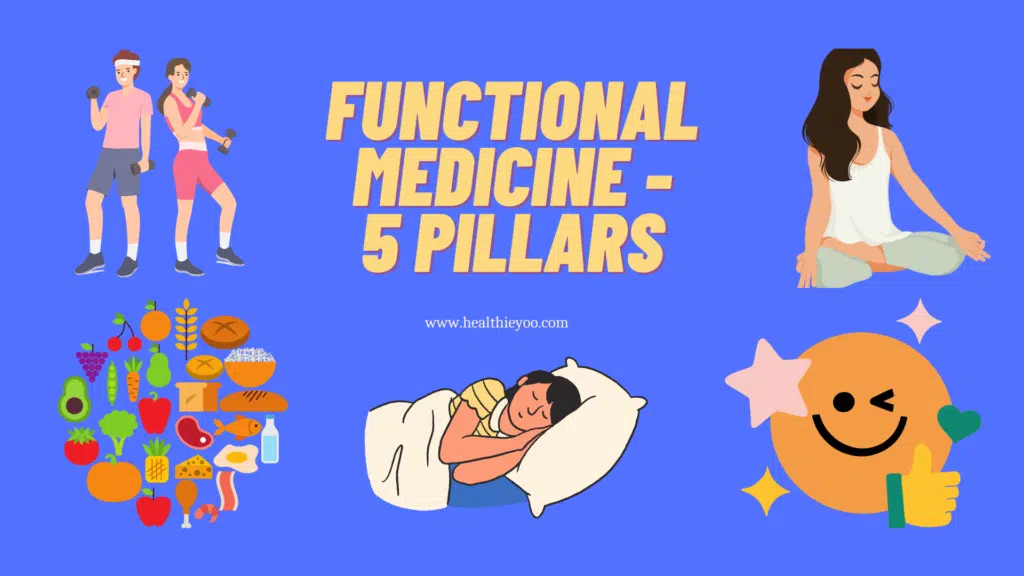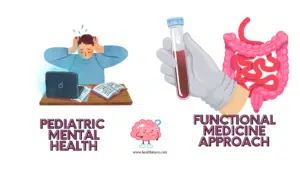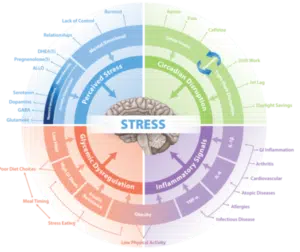Who is a functional medicine pharmacist? What certifications are required for a functional medicine pharmacist? Here are the 5 foundational pillars of functional medicine and how to integrate them with the multifaceted role of pharmacist.
What is Functional Medicine?
Functional Medicine is discovering the root cause of the symptoms. It is complementary to allopathic medicine. Diagnosing a set of symptoms does not imply that one knows WHAT is causing the symptoms or HOW to reverse them. Functional medicine considers that no two people are the same. The elements that are contributing to one person’s symptoms, may be completely different even though the symptoms are mimicked. Stress, toxins, processed & fast foods, leaky gut, food sensitivities, insulin resistance, thyroid issues, and xeno-endocrine disruption can all play a part in chronic disorders and diseases.
By the time we see symptoms of disease, the process has started long before, sometimes years even. It is important as functional medicine practitioners, that we spend time getting to know the individual, their lifestyle, habits, schedules, diet, stress, genetics, and much more. Each piece of the puzzle can give clues to the whole picture.
Foundational Pillars of Functional Medicine & Health – What are they and how to achieve them?
There are 5 foundational pillars of functional medicine and health- Nutrition, Stress, Exercise, Joy, and Sleep. These work synergistically together and play a vital role in your wellness and can help prevent disease throughout aging. Taking supplements and medicine can only go so far without a healthy lifestyle.
Nutrition
I cannot say enough about being intentional with what we put into our bodies on a daily basis. We are either healing or causing disease. We have all heard about avoiding processed foods, sugars, sweetened beverages, gluten, etc. Although it isn’t always easy, it is something we should strive for.
Nutrition is important because it gives us the nutrients and cofactors for all the metabolic reactions in our bodies. If we are eating processed, junk, and fast food, our body and mental health will ultimately suffer. Nutrition also affects our gut.
More and more information is coming out about the microbiome, the bacteria that live within our gut. Good bacteria do amazing things for us and good nutrition helps keep the bacteria in balance. Approximately 70% of our immune system is in our gut. Healthy digestion and gut mean a stronger immune system. If you have GI issues, we can discuss how functional medicine can help you feel well again.
Stress Management
Being in a constant state of stress keeps our bodies in a flight or fright state. This causes a consistent rise in cortisol (stress hormone) which can skew our other hormone pathways. With stress, our sleep and ability to detox suffer greatly. Stress management is key to keeping our nervous system on a parasympathetic path and decreasing cortisol. Try to prioritize stress management by engaging in one stress-relieving activity at least twice daily.
A few ideas: meditation, yoga, left nostril breathing, box breathing, mindfulness, and visualization. Supporting your body with stress management can allow your body to move into the rest and digest the nervous system response we need for healing and balance to occur.
Exercise
This is mandatory for our bodies, the benefits are endless. At least 150 minutes weekly of vigorous exercise. Start gently and slowly and move forward gradually to more vigorous exercises.
You can start by walking the dog a couple of times a day for 20-minute intervals on, an elliptical or treadmill. Even if you have any type of fatigue, exercise is a must.
Joy
Doing at least one activity every day (even for just 2 minutes if that is all you can do) that sparks joy in your life can be extremely beneficial. This is different for everyone.
Sometimes this may look like self-care and taking care of yourself. Sometimes it makes looks like connecting with those you love. Maybe it’s worshipping. Some people love to cook and bake and say it’s therapeutic. Whatever you love and enjoy, do it often.
Sleep
Sleep is so important for our bodies to recover from the stress of the day. Try to get 7-9 hours of solid sleep nightly to allow the mind and body to regenerate and clean the house.
Practice sleep hygiene: screens off at least 1 hour before bedtime, lower lights before bedtime as well, and do a calming activity- meditation, reading, praying. Make sure your room is dark and quiet. Charge any electronic devices out of the room where you sleep to avoid any EMF interference.
Making one small obtainable goal every 1 to 2 weeks can help set you up for success and better health.

Multifaceted Role of Pharmacist – How Pharmacists Can Contribute to Functional Medicine?
The pharmacist is one of the most important and accessible healthcare entities there is. You can’t walk into a doctor’s office or call the office and get an answer in two minutes, but you can at a pharmacy.
Pharmacists are capable of much more than dispensing medications. They have years of learning under their belts about how medications work, and how they interact with each other, and the body. That’s why pharmacists have trusted sources of medication advice and information.
Here are four things that your pharmacist can do for you beyond just filling your prescription:
Pharmacists help you supplement as needed
Vitamin and over-the-counter supplement recommendations are the most straightforward way a pharmacist can assist. Patients are often confused when they receive a lab result or a doctor’s recommendation, and they do not know what to buy. In addition, physicians frequently overlook drug nutrient deficiencies, but pharmacists can help you figure out which nutritional supplements you need based on the medications you are taking.
Pharmacists help you manage your current medications
Do you have any questions regarding your prescription, how to take it, when to take it, what to avoid while taking it, and other administrative topics? Side effects may have a significant impact on a patient’s quality of life. You might be suffering from the side effects of medication without even realizing it. Are you on multiple medications that might be reacting with each other? Are you looking for a path toward getting off medication? These are all things that pharmacists are trained to help with.
They also know a lot about drug interactions
Patients frequently ask if it is alright to drink alcohol or take other medications while on their current regimen. The answer is not always black and white, but pharmacists have the knowledge to help patients make informed decisions about their care.
Who is a functional medicine pharmacist?
A functional medicine pharmacist that wants to help individuals uncover the root causes of their symptoms. Functional medicine pharmacists utilize lifestyle modifications including nutrition, movement, sleep & eating hygiene, and supplements rather than medications to optimize health.
What certifications are required for a functional medicine pharmacist?
Functional medicine is not taught in pharmacy schools, so while certifications aren’t required, additional training would be necessary to obtain the knowledge found in the functional medicine world.
How to integrate the two professions?
There are a couple of ways- an individual on medications that wishes to make some lifestyle changes and get off of medications or someone that is choosing not to use medications for symptoms and wants to pursue more natural options.
From Pharmacy to Functional Medicine: Going Beyond the Pill
Many pharmacists are leading the way into more non-traditional roles as they expand their career paths. Pharmacists trained also in functional or holistic medicine can recommend lifestyle modifications, suggest specialty lab tests, help you replete nutritional deficiencies, and work with your provider to decrease medication load after digging to find root causes for symptoms and addressing them.
Pharmacists are your go-to source for all things medication-related. Next time you have a question or concern, don’t hesitate to ask your pharmacist for help. They are more than happy to serve as a resource for you and your family.

Keta Dodds
Related Posts

A Functional Medicine Approach To Pediatric Mental Health
Here is the functional medicine approach to pediatric mental health. Check out what is functional medicine and how can functional medicine approach be applied to

The Health Benefits of Eating Walnuts
Walnuts deliver important nutrients & offer science-backed health benefits. They are the best source of essential nutrients & healthy fats. They have also been linked

Pharmacist Fights For Her Kids Battling Cystic Fibrosis, CFLD, CFRD Using Precision & Functional Medicine
Here is a story of a pharmacist fighting for her kids battling cystic fibrosis, a disease that impacts the lungs, and liver causing CFLD, cystic

Women And Gut Health: Its Impact On Periods Health
Gut health, it’s this sexy term that is thrown around in our culture today but what does this term truly mean? Well, I’m going to

Best CBD for Anxiety & Endocannabinoid System
How to select the best CBD for Anxiety? What are Endocannabinoid System and CBD? Check out the real truth about CBD and how CBD works

Improving resistance, resilience, and recovery from COVID-19 through personalised nutrition and lifestyle interventions
A holistic element of improving resistance, resilience, and recovery from long Covid through personalised nutrition and lifestyle interventions is described here highlighting five specific focus

